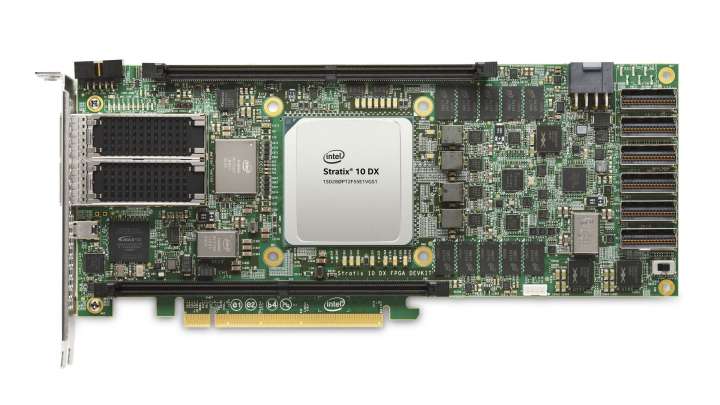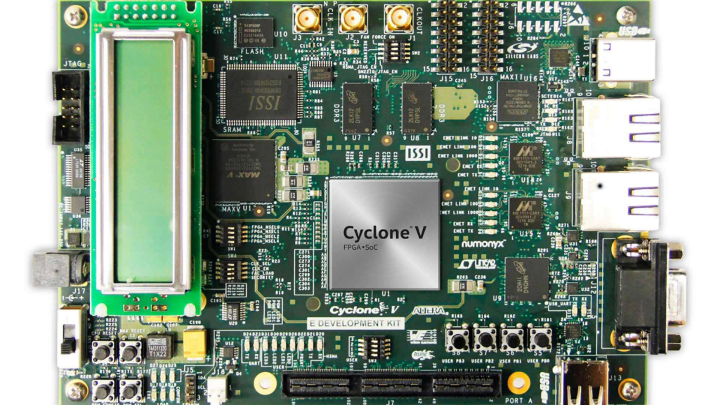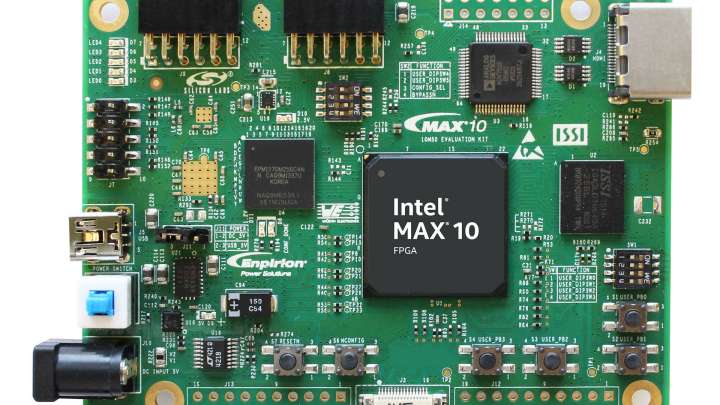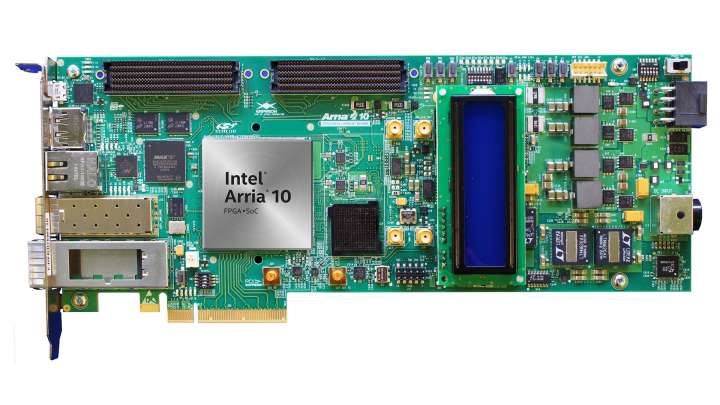Intel/Altera

More from the Category
Altera Corporation has been a leading provider of FPGAs for over three decades. Founded in 1983 by four engineers who left Intel Corporation, Altera's mission was to develop flexible, programmable logic devices that could accelerate hardware innovation. Their first breakthrough product, the EPF10K10 FPGA, was the first EPROM-based FPGA that could be programmed in-system. This allowed engineers to update and modify FPGAs without removing them from the circuit board, a groundbreaking feature at the time.
Following this success, Altera rapidly expanded its product line with more powerful, flexible, and user-friendly FPGA models. The company also introduced robust software tools that enable clients to program and configure FPGAs easily, supporting a wide range of applications and workflows.
Growth Through Market Expansion
By the late 1990s and early 2000s, Altera began expanding into new and more complex markets. The company’s FPGAs were increasingly adopted in telecommunications, networking, and automotive sectors, industries that demanded real-time control, high-speed data handling, and adaptability.
To meet the needs of these sectors, Altera developed advanced FPGA models with faster processing speeds, increased on-chip memory, and improved communication interfaces. The adaptability and power of these devices helped Altera establish itself as a critical supplier in high-performance technology markets.
From Intel Acquisition to Independent Leadership
In 2015, Intel Corporation acquired Altera for $16.7 billion. Under Intel’s wing, Altera was folded into the company’s Programmable Solutions Group (PSG). This integration allowed Altera’s FPGA technology to be paired with Intel’s processor platforms and manufacturing.
A significant shift occurred in 2025. Intel reintroduced Altera as a standalone brand to give the business greater autonomy and focus. In April of that year, Intel sold a 51% stake in Altera to private equity firm Silver Lake for $4.46 billion, establishing Altera as an independent entity once again.
This transition marked the beginning of a new era. Altera gained operational independence, and Raghib Hussain was appointed as CEO. With new leadership and renewed strategic direction, Altera is reasserting its role as a top-tier innovator in the FPGA space.
By spinning Altera back out as an independent company, Intel allows it to pursue focused innovation and faster decision-making, without being limited by the broader goals of a larger corporate structure. This independence, backed by private equity investment, positions Altera to respond more quickly to trends in AI, edge computing, and software-defined hardware, segments where FPGAs are becoming mission-critical. It also opens the door for renewed competition and differentiation in the programmable logic sector, which benefits customers, partners, and the pace of technological advancement across industries.
Read more about Altera's independence from Intel
Altera’s FPGA Product Families
Stratix: High-End Performance

The Stratix family represents Altera’s highest-performing FPGA line. These devices are designed for applications requiring extreme throughput, rapid data processing, and advanced logic functionality. Stratix FPGAs are commonly found in networking systems, communications infrastructure, and high-performance computing platforms.
Engineers leverage Stratix FPGAs to handle tasks like real-time signal processing, encryption, and large-scale data analytics. Their capacity for parallelism and speed makes them ideal for demanding environments.
Cyclone: Versatility and Cost Efficiency

Cyclone FPGAs offer a balanced mix of performance, power efficiency, and affordability. They are particularly suited for embedded systems, IoT devices, and consumer electronics, applications that benefit from low power consumption without sacrificing capability.
These FPGAs provide a reliable solution for real-time control, sensor interfacing, and multimedia processing. Cyclone devices help reduce design complexity and are widely used in industrial automation systems and smart devices.
Max 10: Integration and Low Power

Max 10 FPGAs bring together programmable logic, digital signal processing, embedded memory, and analog features into a single-chip solution. Their low power consumption and compact design make them a favorite in battery-powered devices and portable applications.
They also feature user-friendly capabilities like on-chip analog-to-digital converters, embedded flash memory, and IP encryption, delivering both performance and security.
Arria: Power Efficiency in Focus

Designed for power-sensitive applications, Arria FPGAs offer high functionality while consuming less energy than most comparable devices. They are a preferred solution in wearable technology, AR/VR platforms, and portable electronics where compact design and long battery life are crucial.
Despite their low power profile, Arria FPGAs provide the performance necessary for advanced applications such as health tracking and augmented reality.
Applications Across Industries
Telecommunications
Altera FPGAs are widely used in telecommunications equipment like routers, modems, and switches. Their ability to process data in parallel reduces latency and improves throughput, which is vital for handling modern network demands.
These devices are also programmable to support various protocols, including Ethernet, SONET, and ATM, and can be upgraded as standards evolve—ensuring future-proof solutions for network manufacturers.
Networking
In firewalls, routers, and switches, Altera’s FPGAs enable high-speed packet processing and low-latency communication. Their flexibility allows manufacturers to reprogram them for new protocols, maximizing hardware longevity and minimizing costs.
Interoperability is a key strength, with support for USB, PCI Express, and Ethernet, making these FPGAs a critical component in dynamic and complex network environments.
Automotive
Modern vehicles increasingly rely on real-time data from sensors and control units. Altera’s FPGAs process this data to support applications like engine control, adaptive power steering, ABS systems, and even collision detection and airbag deployment.
They allow automakers to integrate multiple systems into a single chip, enhancing responsiveness, efficiency, and safety across the vehicle.
Industrial Automation
In factories and industrial systems, Altera FPGAs support machine vision, robotics, motion control, and process automation. Their real-time capabilities enable image recognition, quality inspection, and data acquisition, all essential for maintaining product standards and optimizing throughput.
The flexibility of Altera’s FPGAs helps manufacturers adapt to evolving production needs and technologies.
Medical Devices
Altera’s FPGAs power pacemakers, defibrillators, insulin pumps, and diagnostic equipment. Their reliability, low power usage, and real-time signal processing allow medical devices to operate continuously and accurately under strict regulatory standards.
These devices enable life-saving solutions through efficient data handling, customizable logic, and extended operational lifespans.
Defining Features of Altera’s FPGA Technology
Altera has long been a pioneer in FPGA innovation. Some of its key contributions include:
In-System Programmable FPGAs
This feature allows FPGAs to be updated while still installed in hardware. Engineers can apply firmware updates in the field without removing the device, making development and maintenance faster and more efficient.
High-Speed FPGAs
Altera’s architecture supports fast data processing, ideal for networking, packet routing, and encryption. These FPGAs can handle massive data loads while maintaining low latency and high throughput.
Low-Power FPGAs
Designed with energy efficiency in mind, these FPGAs are optimized for use in battery-dependent systems like medical implants and consumer wearables. They provide performance without compromising power.
Radiation-Tolerant FPGAs
Altera also offers radiation-tolerant versions for aerospace and defense applications. These FPGAs withstand harsh radiation environments, making them ideal for space missions and military systems.
Altera FPGAs: The Future of Digital Innovation
Altera has solidified its reputation as a leading provider of FPGAs through a mix of innovation, adaptability, and reliability. Their FPGAs are highly valued for their:
• High performance in data-intensive environments
• Low power consumption for energy-sensitive applications
• Flexibility for rapid reprogramming and prototyping
• Broad usability across telecommunications, automotive, aerospace, industrial, and medical fields
With the 2025 rebranding and strategic investment by Silver Lake, Altera is poised for a new era of leadership and growth. Its commitment to programmable logic and continuous improvement ensures that Altera will remain a central player in the advancement of digital systems.
Partner with Microchip USA
Explore our complete line of FPGA products or speak with one of our experts to find the component solution for your next innovation. Contact us today!